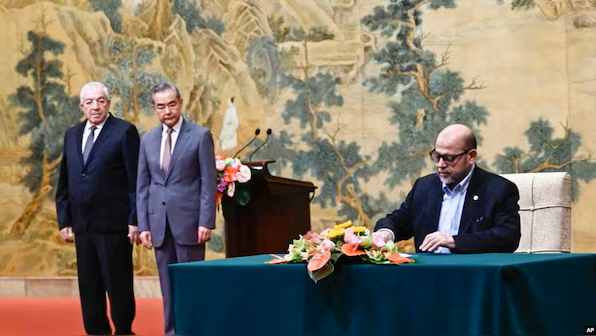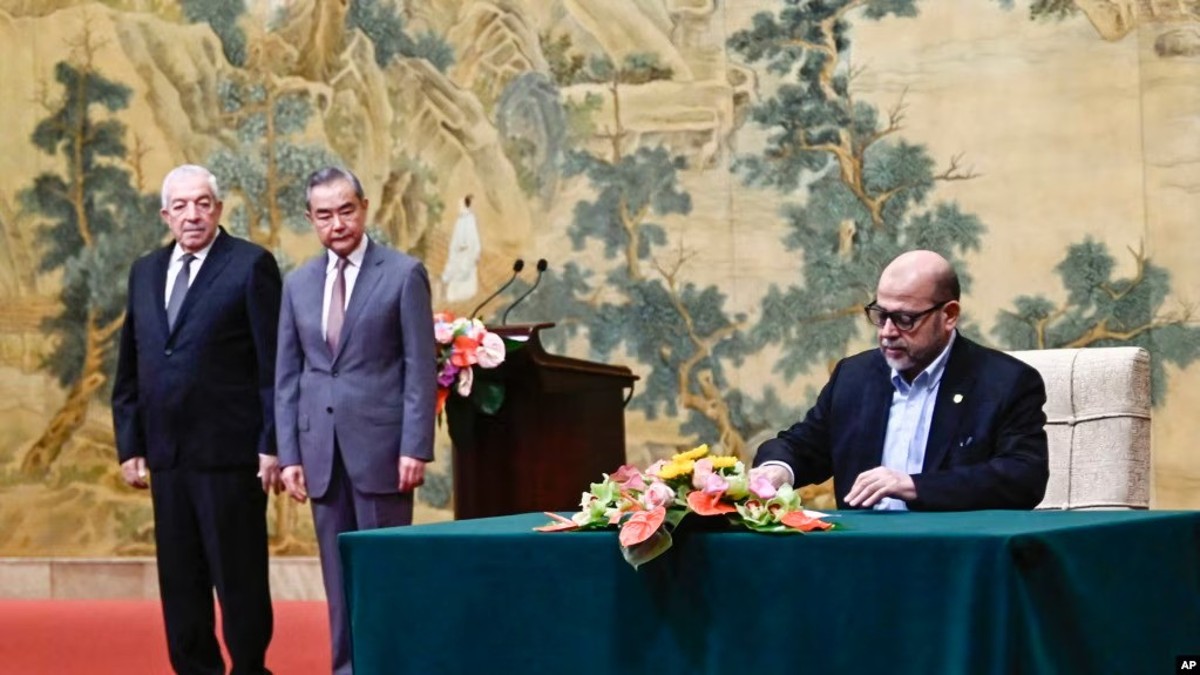Chinese checkers in West Asia: Why peace remains elusive in Gaza
- August 14, 2024
- Posted by: Anil Trigunayat
- Categories: China, USA

Although both China and the US proclaim their support for the ‘Two State Solution’ to the Palestinian-Israel issue, they seem to be on the two opposing banks of the ‘River to the Sea’ chimera claimed by both Israel and Palestine
)
)
Senior member of Hamas, Mussa Abu Marzuk, right, signs a document as Chinese Foreign Minister Wang Yi, second left, and Vice Chairman of Fatah Mahmoud al-Aloul look on, at Diaoyutai State Guesthouse, Beijing, July 23, 2024. AP
It was perhaps no coincidence that China hosted Hamas and Al Fatah along with twelve other Palestinian groups for a unity conference and Israeli Prime Minister Benjamin Netanyahu blew his trumpet in a Washington, DC, meeting, addressing the high and mighty.
Although both China and the US proclaim their support for the ‘Two State Solution’ to the Palestinian-Israel issue, they seem to be on the two opposing banks of the ‘River to the Sea’ chimera claimed by both Israel and Palestine.
Advertisement
Mirage merely deepens as the war rages on, decimating Gazan civilian lives and causing more uncertainty and escalation possibilities in the region. Still, both of these events are important, whose import will be witnessed in times to come. Some say that now that President Joe Biden is absolved of the shackles of electioneering, he might focus a bit more on the two wars that have the potential to define the new world order, if at all there will be one.
China is heavily invested in the Middle East (West Asia) and has cast its lot with the Arabs and Palestinians even as supporting the ‘Two State Solution’ on the basis of 1967 borders broadly as defined in the 2002 Arab Peace Plan with east Jerusalem as the capital of the State of Palestine.
You May Like
Decades Later Carly Simon Finally Confirms Who “You’re So Vain” Is Really AboutJpost_magazineRead More
How would those geographical contours be achieved on the ground, if at all there is some agreement with Israel, will be the biggest challenge. What would be the compromises and under what conditions that will ensure the security and sovereignty of both Israel and Palestine will be the deciding factors for any movement forward.
Meanwhile, after its real success as a peacemaker between Riyadh and Tehran, Beijing is trying to position itself as cupid, at least for the Palestinians, while it has peeved the hardliner government in Tel Aviv despite the extensive economic engagement with Israel.
One of the biggest drawbacks of the Palestinian quest has been the vertical divisions and wars of supremacy among various groups, especially Al Fatah and Hamas, and their approaches, which had to a great extent defied any momentum on the Israel-Palestine issue for decades now. It helped the deep state designs of Israeli leadership, especially Netanyahu, who was often accused of supporting and sustaining Hamas all this while. It was only after October 7-terror strikes by Hamas that he vowed to destroy them.
Advertisement
But Beijing has thought of addressing the issue upfront and hence has been working for quite some time on all Palestinian factions to have a unified approach under the Palestine Liberation Organisation (PLO).
Hence, on July 23, Foreign Minister Wang Yi declared that “an agreement has been reached on post-Gaza war governance and the establishment of a provisional national reconciliation government”.
The exact terms and the role of Hamas, going forward, will probably be known only in the future, but China has displayed its role as a peacemaker that has been appreciated by the Arab world and many others. Israel has, of course, as expected, criticised the Beijing Declaration as well as the Palestinian Authority (PA) and President Abbas for hobnobbing with the terror outfits.
Advertisement
Netanyahu has repeated that he would not handover Gaza to become Hamastan or Fatahstan. Only the US and internal support to some modus vivendi at the popular level could allow a Palestinian Authority rule in Gaza. As such, Hamas and Fatah have tried to get past their differences and problems over a dozen times, including their pact in 2021 and Algeria Accord in 2022, but every time back to square one, turning the handshakes into fisticuffs. Will it be any different this time remains to be seen!
Meanwhile, the UAE, Egypt, and the US have also been discussing post-war Gaza governance and reconstruction and are discussing the possibility of a regional security force to stabilise as the Palestinian Authority integrates governance of Gaza and the West Bank, where political Hamas can or cannot have some role as well. As of now, Biden has not shuttled as much in any conflict and the least traction he got due to prevailing intransigence and maximalist positions on both sides. That could be a red line for Netanyahu and the US, but the ongoing ceasefire negotiations are still holding out some promise. Biden has not shuttled as much in any conflict and the least traction he got due to prevailing intransigence and maximalist positions on both sides.
Advertisement
Netanyahu in Washington, while addressing the Congress, was at his best in his tirade as he successfully veered and encashed on sympathy for Israel, very well managed by the powerful Jewish lobby and US deep state.
Even though Vice President Kamala Harris was away for her election campaign and could not chair the session, which could notionally assuage the Arab lobbies and protesters opposing the Israeli disproportionate response against the Palestinians. Being a master blaster and a wily politician, he successfully deflected the attention of US lawmakers and the public at large from the plight of the Palestinians towards the security and terror threats from a nuclear Iran and its proxies in Hamas, Houthis, and Hezbollah, projecting himself as the first line of defence for the Americans, underscoring, “We are protecting you.” He castigated the protesters. “Yet incredibly many anti-Israel protesters, many choose to stand with evil. They stand with Hamas.”
Advertisement
The Israeli PM smartly invoked the security threats to America and not only to Israel when he started “We meet today at a crossroads of history. Our world is in upheaval. In the Middle East, Iran’s axis of terror confronts America, Israel, and our Arab friends. This is not a clash of civilisations. It’s a clash between barbarism and civilisation. It’s a clash between those who glorify death and those who sanctify life,” adding, “For Israel, every civilian death is a tragedy. For Hamas, it’s a strategy.”
He also recalled April 14 US support in neutralising Iranian missiles and drone attacks. No wonder the captive audience gave him an unprecedented standing ovation 58 times—a feat indeed that would ensure continued US assistance and supplies of all arms and ammunition to continue his war against Hamas at all costs. He also clarified in no uncertain terms that they did not want to occupy Gaza but would not allow its security to be controlled by others so that situation and terror groups crop up again.
Calling his friendship with the US, he sealed it as, “Working together, I am confident that our two nations will vanquish the tyrants and terrorists who threaten us both. … Israel will not relent, and Israel will not bend.” Meanwhile, Senator Benie Sanders was yet again caustic in his criticism of Netanyahu and US policies.
With these contradictory positions, Beijing’s efforts will weigh against Washington and Tel Aviv’s stance, and how some modus vivendi, let alone the Two State Solution, can be found is a gaping question as ever before. But the quest for peaceful coexistence must not be given up by all major actors.
The author is the former Indian Ambassador to Jordan, Libya and Malta and is currently a Distinguished Fellow with Vivekananda International Foundation.
